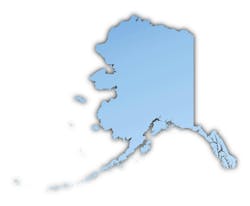US government’s ANWR lease sale a bust; no companies bid for tracts
The US Bureau of Land Management received no bids for the congressionally mandated oil and gas lease sale offering 400,000 acres in the coastal plain of Alaska’s Arctic National Wildlife Refuge (ANWR).
This is the second consecutive ANWR lease sale in 5 years with low to no industry interest.
The first sale, held January 2021 during the first Trump administration, yielded a total of $14.4 million in high bids on 11 tracts (OGJ Online, Jan. 6, 2021).
Of the nine leases sold during the previous sale, the two held by oil companies were canceled and refunded at the request of lessees. The remaining seven, held by the Alaska Industrial Development and Export Authority (AIDEA), were canceled by Interior Secretary Deb Haaland due to "multiple legal deficiencies in the underlying record," Interior said. There are currently no existing leases in ANWR.
Congress included the two ANWR lease sales in the 2017 Tax Act, estimating the sales would generate $2 billion in revenue over 10 years.
Competing perspectives
Acting Deputy Secretary Laura Daniel-Davis said lack of industry interest in the sales "exposed the false promises" made in the Tax Act. "The oil and gas industry is sitting on millions of acres of undeveloped leases elsewhere; we'd suggest that's a prudent place to start, rather than engage further in speculative leasing in one of the most spectacular places in the world," she added.
Some analysts say the industry is not interested in ANWR, because while rife with hydrocarbons—ANWR might hold 4.3-11.8 billion bbl of technically recoverable crude, according to the US Geological Survey—development is expensive as is bringing product to market.
Environmentalists and native Alaskans, including Gwich’in people who consider the area sacred, have warned companies would face intense public scrutiny for pursuing new oil and gas development in the refuge as doing so would threaten pristine wilderness and certain wildlife.
Industry and Alaska officials said the lack of bids in the latest lease sale was the result of too many restrictions.
The AIDEA and the state of Alaska recently challenged the latest sale in federal court, arguing that lease terms and limited acreage offered violated the Congressional statute and will hurt future oil and gas development in the region.
Randy Ruaro, AIDEA executive director, requested a new auction, arguing that the sale was "illegal and broken" and that "the terms and conditions imposed by the Department of Interior are so strict and onerous that you cannot economically produce oil there."
The lack of interest may threaten President-elect Trump’s vow to expand America’s energy potential.
Trump earlier this week said his administration is committed to "opening up ANWR."
The Biden administration has worked to block oil and gas companies from Alaska development. In 2024, the Interior Department retained protections on 28 million acres of D-1 public lands in the state, reversing a Trump-era bid to allow oil and natural gas leasing on the land (OGJ Online, Aug. 28, 2024).
Biden's administration followed with a rule to sharply reduce potential acreage for leasing in the National Petroleum Reserve-Alaska, oil-rich federal lands that cover much of the North Slope (OGJ Online, Sep. 7, 2024).
About the Author
Cathy Landry
Washington Correspondent
Cathy Landry has worked over 20 years as a journalist, including 17 years as an energy reporter with Platts News Service (now S&P Global) in Washington and London.
She has served as a wire-service reporter, general news and sports reporter for local newspapers and a feature writer for association and company publications.
Cathy has deep public policy experience, having worked 15 years in Washington energy circles.
She earned a master’s degree in government from The Johns Hopkins University and studied newspaper journalism and psychology at Syracuse University.
